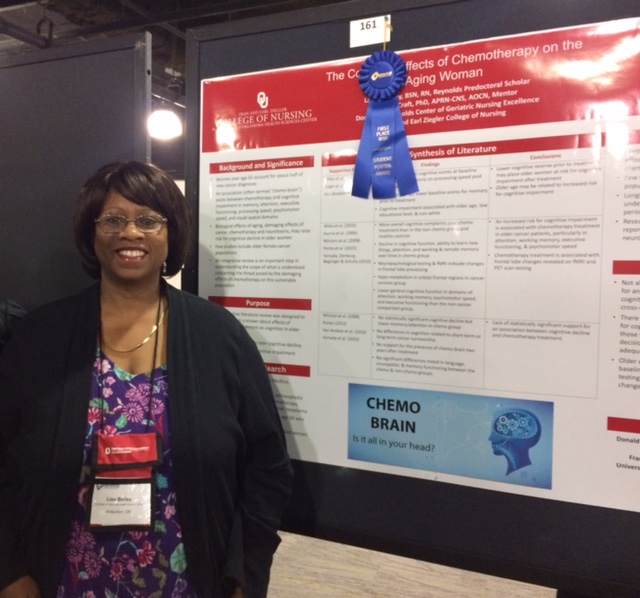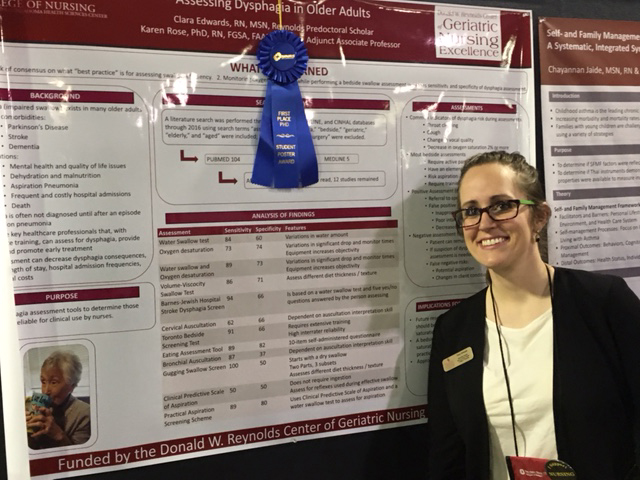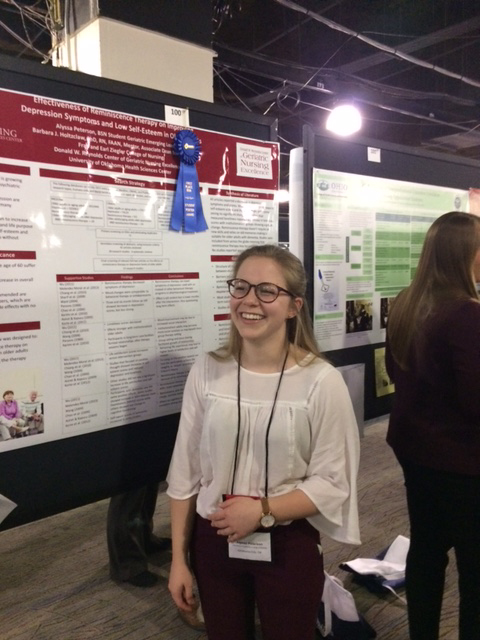

From the moment they begin working toward a doctoral degree in nursing science, students at the Fran and Earl Ziegler College of Nursing at the OU Health Sciences Center learn about the importance of research to their careers.
To continually improve the profession and uncover new answers for the care of patients, nurse scientists conduct research in a multitude of areas, from cognitive effects of chemotherapy to depression in older adults.
Several students conducting research excelled at this year’s conference of the Midwest Nursing Research Society, a 13-state regional organization that promotes nursing science and supports the next generation of nurse scientists.
OU students won first place with their research posters in all three categories of competition: at the bachelor’s, master’s and doctoral degree levels.
“We have amazing students who are dedicated to the pursuit of research,” said Barbara Holtzclaw, Ph.D., RN, FAAN, associate dean for research at the OU College of Nursing. “Everything that nurses do for patients should have research evidence for it, and our students are being prepared to make a significant difference in their professions.”
Winners at the recent conference are:
* Alyssa Peterson, honors graduate, first place at the bachelor’s degree level, for her poster “Reminiscence Therapy to Improve Depressive Symptoms and Low Self-Esteem in Older Adults.” Her mentor is Dr. Barbara Holtzclaw.
* Lisa Bailey, first place at the master’s degree level, for her poster “Cognitive Effects of Chemotherapy on the Aging Woman.” Her mentor is Dr. Melissa Craft.
* Clara Edwards, first place at the doctoral degree level, for her poster “Assessing Dysphagia in Older Adults.” Her mentor is Dr. Karen Rose.
* Norma Hennen, honorable mention at the doctoral degree level, for her poster “Coercive Control and Suicide Risk: What is Known?” Her mentor is Dr. Janet S. Wilson.
Presenting their research at conferences is only one benefit of the experience. Students develop mentors within the MNRS community of scholars who serve as guides throughout the educational journey.
“We are very intentional about helping students develop mentoring relationships,” said Melissa Craft, Ph.D., APRN-CNS, AOCN, who is director of the college’s Ph.D. program and the Clinical Nurse Specialist program. “The mentors are doing research in their fields that is very exciting for the students, and they learn what it’s really like to incorporate research into their careers. It makes it real for students in a way that we can’t accomplish in lectures.”
The OU College of Nursing is the only doctoral program in Oklahoma that educates nurse scientists. The program is full of people who love the clinical practice of nursing and want to contribute to the field with research. In both research and practice, the patient is at the center of everything they do. Nurses may see 15 people a day in a clinical setting, but with research, findings may translate to benefit 1,500 people.
“Research is taking our knowledge and passions and working with patients in a way that will make a difference,” Craft said.
Nurse scientists don’t just work in academic settings. Hospitals and medical centers across the nation have research positions, which are attractive for nurses who want to stay in a clinical setting.
Lisa Bailey, who is working toward her doctorate, said her first-place award at this year’s conference was gratifying because of her topic and the recognition of its importance. She investigates the cognitive dysfunctions experienced by women who have undergone chemotherapy.
“While a diagnosis of breast cancer is overwhelming within itself, the struggles do not end when treatment is complete,” Bailey said. “Many of these women are dealing with alterations in their mental functioning while trying to adjust to life as a cancer survivor and maintain their role in life. I am driven to better understand this phenomenon, effective coping mechanisms and interventions that preserve quality of life for those who are effected.”
Knowing that her mentors, both at the OU College of Nursing and across the nation, will guide her education is exciting, she said. “Meeting and interacting with others in the profession provides vital connections to those with a similar research focus with whom I may be able to collaborate as I advance in my career,” Bailey said. “I left the conference with the feeling that I am moving in the right direction, and I have a high level of confidence to continue my research endeavors.”













